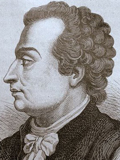 |
Honoré-Maximin Isnard
b. 24 Feb 1758, Grasse, Var [1]
d. 12 Mar 1825, Grasse, Var |
| Title: |
Président de la Convention nationale (President of the National Convention) |
| Term: |
16 May 1793 - 30 May 1793 |
| Chronology: |
16 May 1793,
elected, session of the National Convention, salle des Machines, Palais national des Tuileries, Paris [2] |
|
17 May 1793,
assumed the chair, session of the National Convention, salle des Machines, Palais national des Tuileries, Paris [3] |
|
30 May 1793,
ceased to exercise the functions of office upon the election of a successor [4] |
| Names/titles: |
First name also recorded as: Henri-Maximin; baron Isnard, baron de l'Empire (baron Isnard, baron of the Empire) [from 2 Oct 1813] |
| Biography: |
| Born in the family of a rich merchant; was engaged in trade and established a perfumery business at Draguignan; elected to the Assemblée nationale (National Assembly) (1791-1792) as a representative of the département of Var; sided with the Girondins; demanded the disbandment of the king's bodyguard, reproached King Louis XVI for infidelity to the Constitution; elected (5 Sep 1792) to the Convention nationale (National Convention) (1792-1793, 1794-1795) as a deputy for Var; voted for the death sentence in the trial of Louis XVI; reported on the creation of the Comité de salut public (Committee of Public Safety) on 6 Apr 1793; served as President of the National Convention (16 May 1793 - 30 May 1793) during the final days of confrontation between the Girondins and the Montagnards [5]; avoided the proscription together with the Girondin deputies decreed by the National Convention (2 Jun 1793); was forced to subscribe to "voluntarily" suspension of his functions as deputy (2 Jun 1793); arrested on orders of the Commune of Paris (28 Sep 1793); escaped and went into hiding; returned to politics and regained his seat in the National Convention (4 Dec 1794) after the Thermidorian coup d'état; was elected (14 Oct 1795) to the Corps législatif; selected to sit in the Conseil des Cinq-Cents (Council of Five Hundred) as a deputy for Var (1795-1797); retired from politics and devoted himself to literature; published Proscription d'Isnard (1795), Réflexions relatives au sénatus-consulte du 28 floréal an XII (1804), Dithyrambe sur l'immortalité de l'âme (1805); was not proscribed as regicide due to religious and royalist sentiments expressed in his writings. |
| Biographical sources: Dictionnaire des Conventionnels, 337-340;
Dictionnaire des parlementaires français 1789-1889, 3:384-386. |
| Elections: |
| Candidate |
Votes (16 May 1793) |
| Honoré-Maximin Isnard |
202 |
| Jacques-Alexis Thuriot de la Rosière |
n/a |
| voters/absolute majority |
332/167 |
|
| Source of electoral results: Archives parlementaires - Série 1, 64:768;
Procès-verbal de la Convention nationale, 12:18.
|
| |
| [1] |
Isnard was born 24 Feb 1758 and baptised 25 Feb 1758 as is evident from his baptismal record preserved in the Archives of the Alpes-Maritimes département, register of baptisms, marriages and burials in the parish of Grasse, 1757-1758, f. 15; birth date is correctly given in
Dictionnaire des Conventionnels,
Dictionnaire de biographie française, vol. 18,
Dictionnaire historique de la Révolution française, while a number of biographical works erroneously state that he was born on 16 Feb 1751 or 18 Feb 1758. |
| [2] |
Archives parlementaires - Série 1, 64:768;
Procès-verbal de la Convention nationale, 12:18. |
| [3] |
Archives parlementaires - Série 1, 65:1. |
| [4] |
Archives parlementaires - Série 1, 65:628;
Procès-verbal de la Convention nationale, 12:276;
Moniteur universel, 1er semestre de 1793, p. 659. |
| [5] |
A violent incident caused by energetic response of Isnard to the petition of the Parisian section of Cité and verbal attacks of Jean-Paul Marat forced Isnard to abandon the chair amidst the session of 27 May 1793. Jean-Baptiste Boyer-Fonfrède and then Marie-Jean Hérault de Séchelles chaired the rest of the meeting. |

